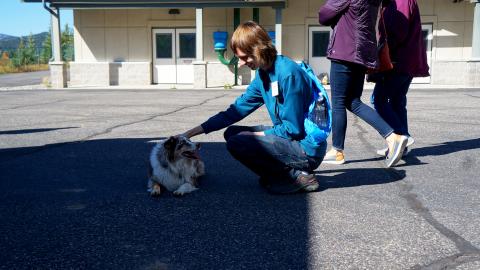By: Nolan Choquette
“It transcended thinking of water’s importance, to experiencing it on an instinctual human level.”
The 2019 Nebraska Water & Natural Resources Tour emphasized one point: water connects us all. Every person in every part of the world has their own connection to water. Each area has their own difficulties and histories, but we can connect over our shared need for it. Sharing these experiences allow us to learn from each other, as well as connect on a human level. Each of our stops along the tour expressed this point.
Our stop at Buffalo Bill Dam showed us one of our nation’s first attempts to build a structure to harness the natural water. The people involved in designing the project had not designed a dam before and had to figure out the process as they went. Additionally, the hard-stone walls they were building into made for further troubles. Despite this, the desire for a reservoir for irrigation was strong enough to overcome these adversities. Two additions had to be made to the project to accommodate future human use, making this project a shared history for people over an era.
At Yellowstone we had a Native American guide share the history of the water of the area. This examined water from less of a mechanical standpoint and more of a spiritual one. For any ritual he described, water was involved, if not central, to the proceedings. He described that everyone in his tribe underwent an extended fast from food and water. This experience he described as understanding the importance of water on a fundamental level. It transcended thinking of water’s importance, to experiencing it on an instinctual human level.
We also met with various community members who dealt with water rights in Montana. Some represented consumers, permitting agencies, or people who helped with analysis, but all work on the same subject of water. Each different expertise is necessary to get a holistic understanding of the circumstances surrounding their water and determine the proper course of action. While Montana handles water rights differently than states like Nebraska, the matter of determining who has rights to use water is universal. Determining who can use water and making sure all the water is not used is an important matter regardless of where you go. Getting insights into how the people of Montana handled these issues allowed for a perspective on the issue as a whole.
Overall, the tour allowed for exposure to water through various lenses. Each stop showed both an interesting location, a unique set of problems, and how those problems were being handled. This combination made the trip both an enjoyable one and an educational one.
About the author: Nolan Choquette is a junior civil engineering major at the University of Nebraska at Omaha.

